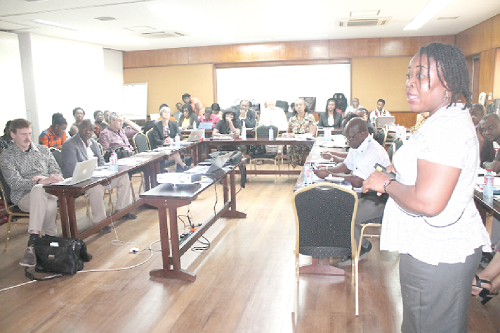
Implications of pregnant women’s decisions on quality of maternal care
The International Conference on Population and Development (ICPD) held in Cairo in 1994 marked the acceptance of a new paradigm in addressing human reproduction and health. The conference recognised women’s rights to reproductive and sexual health as being key to women’s health.
Advertisement
Right to autonomy
Of central importance are the rights to autonomy and privacy in making sexual and reproductive decisions, as well as the rights to informed consent and confidentiality in relation to health services.
Reports of a study undertaken by six researchers, on various topics related to maternal and neonatal health, have revealed various issues related to the topic.
One of the report showed that pregnant women used strategies to protect the confidentiality of the medical and reproductive information they exchanged during the history taking process with health officials.
Dubbed, “Health Worker Attitudes; Its Influence on Pregnant Women’s Decisions and Implications on Quality of Maternal Care in the Greater Accra Region,” the 19-month study, undertaken by Madam Linda Lucy Yevoo from the School of Public Health of the University of Ghana (UG), indicated that pregnant women primarily misinformed health workers about their reproductive information to avoid healthcare providers’ reprimands and humiliations.
According to the study, that is because, during history taking, healthcare providers often showed anger and insulted women or made sarcastic comments when information provided by the pregnant women on their reproductive status did not meet the healthcare provider’s standards and expectations.
Presentations
The other five researchers also made presentations on various related topics that affected quality health delivery in the hospitals and how they affected women’s health.
They were Mr Gbenya A. Kayode from the Julius Centre for Health Sciences and Primary Care, who made a presentation on “Individual and Population-Based Interventions to Improve Neonatal Survival in Ghana”; another on “Complete Adherence to First Antenatal Care Guidelines Reduces Neonatal and Delivery Complications” by Dr Mary Amankoh-Coleman from the School of Public Health of the University of Ghana and “Realist Approaches to District Manager Decision-Making for Maternal and Newborn Health in the Greater Accra Region, Ghana” by Madam Aku Kwamie.
Other topics were: “Maternal Health Policy Decision-Making in Ghana: The Pivotal Role of Policy Actors and Context” by Madam Augustina Koduah, and “Health Workers Motivation and Attitudes in the Provision of Maternal and Neonatal care in Ghana” by Madam Matilda Abrese Ako from the Navorongo Health Research Centre.
Confidentiality
Madam Yevoo said pregnant women used strategies to protect the confidentiality of the medical and reproductive information they exchanged during the history taking process because most often, the history taking area and the consultation rooms did not provide them the minimum privacy they required.
That way, she said, they prevented humiliation and possible implications between them and others when confidential information was disclosed.
Additionally, it also prevented pregnant women from receiving reprimands from healthcare providers; because of reporting late for antenatal care than the date recommended, and were not reprimanded for the number of pregnancies and self-induced abortions already done.
She made this known during an accelerated project dissemination and policy discussion meeting for improved use of maternal and neonatal health (MHN) research findings.
About the project
The project seeks to promote reduction in maternal and infant mortality, by developing and evaluating multi-level such as client, frontline worker, district and national approaches for accelerated attainment of the Millennium Development Goals 4 and 5, through strengthening basic health systems in Ghana.

The objective of the meeting was, therefore, to disseminate final research findings to inform policy makers, partners and stakeholders on evidence regarding what had been achieved through scientific research and its implications for the MDGs and the newly-adopted Sustainable Development Goals (SDGs) in Ghana.
Improve attitudes
Madam Yevoo said at the healthcare level, there was the urgent need for healthcare workers to improve their attitudes and interactions with clients and refrain from making undesirable comments about them.
At the healthcare institution level, she said, it was essential for them to improve the level of privacy in their various health facilities as that would instill confidence in the women, to provide the right reproductive and medical information to their healthcare providers.
That, she said, could be achieved by reducing co-consultation practices at the facility level and also introduce a shift system at the antenatal care unit as a way to reduce the number of clients seen by a midwife in a day.
Policies and recommendation
In her presentation, Madam Ako said there were no clear lines of authority between frontline health workers, especially doctors and nurse-anaesthetists.
That, she said, contributed to power struggles between collaborating professionals.
Her study, an ethnographic study, which involved participant observation, in-depth interviews and conversations, also revealed that conflicts contributed to poor collaboration between health professionals in the provision of health care.
This subsequently led to a sense of frustration, disempowerment and demotivation of health workers.
Madam Ako said national health policies and legislation did not give hospital managers adequate power to make decisions on human and other resources relevant for quality healthcare provision.
As a result, she said conflicts within the workplaces remained unsolved and continued to fester and such staff could not be disciplined.




